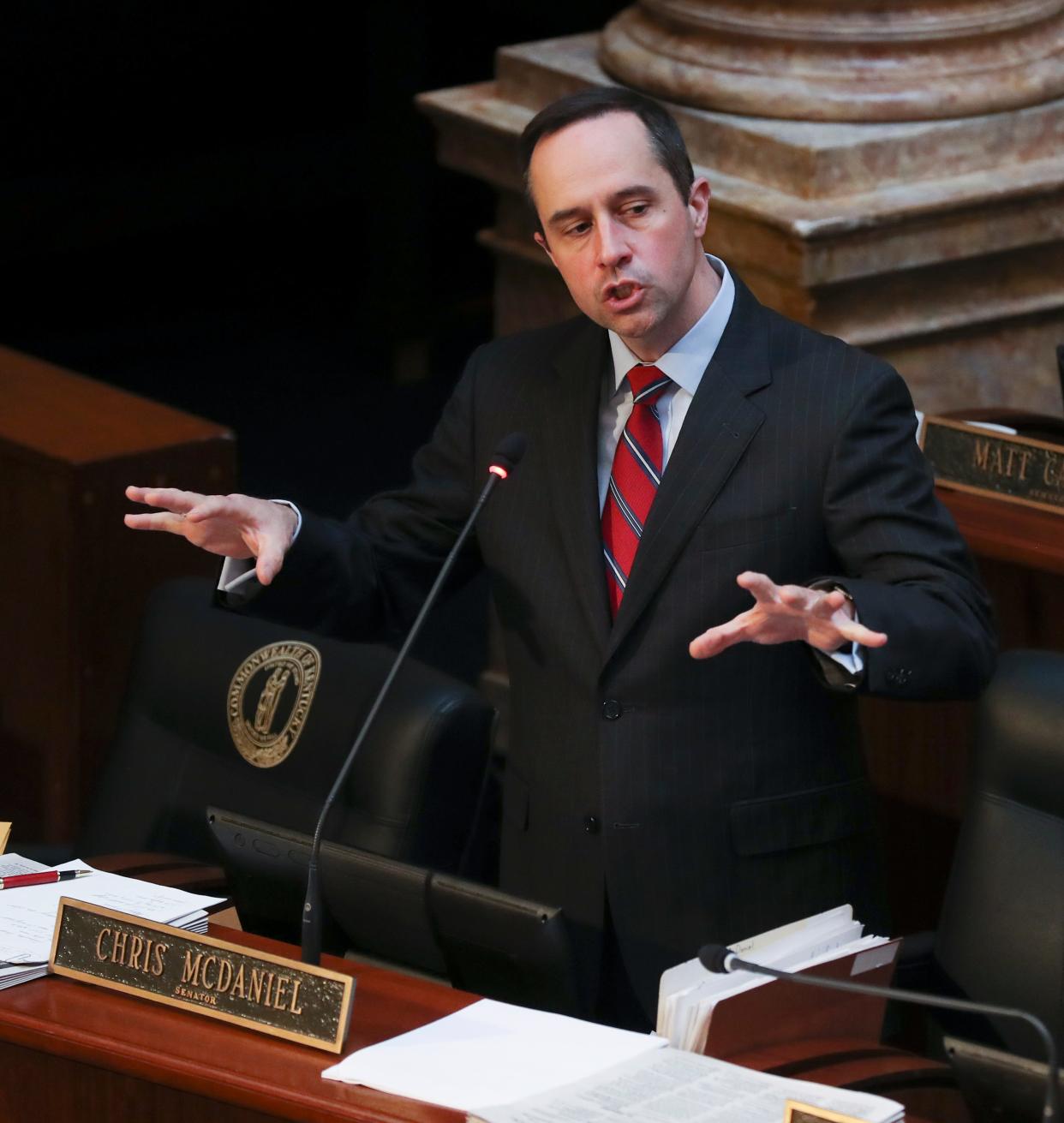Kentucky budget gets final legislative approval: No '13th check' for state retirees

FRANKFORT — Kentucky's budget is set to include 3% pay raises for state employees and modest education spending increases, but no dedicated pay raises for teachers or extra checks for state retirees.
The budget bill will now be sent to Gov. Andy Beshear, who can veto specific items in the budget.
The two-year budget totaling more than $100 billion that lawmakers approved Thursday night will likely allow the state to hit spending targets and reduce income taxes from the current 4% to 3.5% beginning in January 2026, said Senate budget chairman Sen. Chris McDaniel, R-Ryland Heights.
Critics say the bill's "largely austere" approach to spending fails to leverage the state's record $3.7 billion "rainy day" fund to improve social services and education.
The future tax cuts come at a high price, Democrats said of the budget.
“This budget was designed to spend an amount that keeps the commonwealth under the thresholds necessary to cut the income tax,” Rep. Josie Raymond, D-Louisville, said. “It means Kentucky will continue to deprive its people as revenues dwindle, and we are unable not just to invest, but to meet the obligations of our neighbors.”
No extra check for state retirees
State retirees, who have not had a pension cost-of-living increase since 2011, will not get a one-time additional payment, which many called “13th check.”
Beshear’s budget proposal called for the extra check, but the initial House budget proposal did not. A later Senate budget bill included the extra money for state retirees.
However, the version of the budget passed Thursday night did not include the extra check, an apparent casualty of legislative horse-trading.
“It was taken out in the course of the negotiations,” McDaniel told reporters.
Modest education increases but no teacher raises
The budget will increase per-pupil education funding by 3% next fiscal year and 6% the following year. In other words, the current per-pupil base funding rate of $4,200 will increase by $386 over the next two fiscal years.
The budget does not include additional funding for raises for teachers and other school employees. Beshear had asked for 11% across-the-board school employee raises.
GOP leaders rejected that proposal.
McDaniel said local school districts can and should pay for teacher raises out of the increased education funding but that "under our view of the constitutional funding formula," also known as SEEK, the legislature cannot mandate teacher raises.
"It’s possible to both fund a separate raise and increase SEEK adequately and be in line with constitutional duties," said Jason Bailey, executive director of the Kentucky Center for Economic Policy.
The budget will also increase per-pupil transportation funding over the next two fiscal years. However, it uses fiscal 2023 numbers rather than current or projected transportation costs to calculate those increases.
House budget chairman, Rep. Jason Petrie, R-Elkton, said the calculations are based on older transportation figures because fiscal 2024 has not yet ended.
That drew questions from lawmakers like Raymond, and Bailey of the Kentucky Center for Economic Policy.
Where bills stand: Safer Kentucky Act, JCPS task force, Louisville nonpartisan elections
“Every year by March 1, the Department of Education produces these numbers for the current fiscal year. So, we have the final number for 2024 already,” Bailey said. “It’s just a choice not to use the most updated data.”
The budget also does not include funding for universal pre-K program. Beshear’s budget proposal included $172 million annually to fund that program.
What’s in it for Louisville?
The budget bills include funding for Louisville specific projects. Those include:
$100 million across two years for downtown Louisville. Those funds will go to The Belvedere; Community Care Campus; LOUMED Campus; Louisville Gardens; Downtown Vacant Lot Revitalization; and Butchertown Sports District.
$5 million for improvements at the Louisville airport
$5 million in fiscal 2025 to support the completion of the campus of Louisville’s Harbor House, a community center for teens and adults with disabilities
$1.5 million to establish an Immigration Law Clinic at the Louis D. Brandeis School of Law in fiscal 2025. The clinic will help Cuban immigrants with paperwork, so they can more quickly get jobs in Kentucky.
$750,000 in fiscal 2025 to pay for an audit of Jefferson County Public Schools, with an authorization in the following final year.
More social workers but little for affordable housing
The budget also includes funds to hire an additional 100 social workers over the next two fiscal years. It also includes funds to increase the number of "waiver slots" for programs that help people with intellectual and physical disabilities get care at home or within their communities rather than in institutions.
It includes little for affordable housing, however. Their budget does not include any funding for the Affordable Housing Trust Fund. It includes $5 million for the next two years for the Rural Housing Trust Fund and a one-time $10 million allocation for Lexington’s Transformational Housing Affordability Partnership.
Sen. President Robert Stivers, R-Manchester, also pointed to the earmarked funds for Louisville's Community Care Campus as money to support affordable housing.
Reach Rebecca Grapevine at rgrapevine@courier-journal.comor follow her on X, formerly known as Twitter, at @RebGrapevine.
This article originally appeared on Louisville Courier Journal: Kentucky legislature passes budget. No 13th check for state retirees
